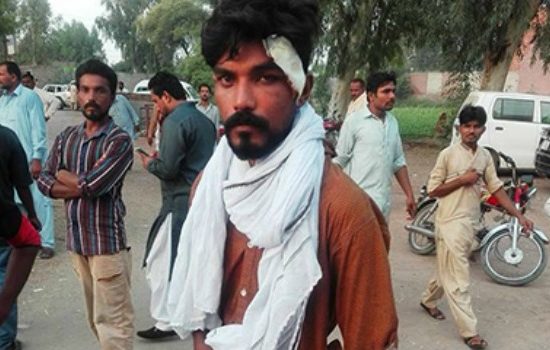The Psychological Toll of False Blasphemy Accusations in Pakistan

11/11/2024 Pakistan (International Christian Concern) — For Christians in Pakistan, the consequences of facing blasphemy accusations are demonstrably horrific. Less clear, however, are the consequences for Christians who have not yet faced such accusations.
There is an atmospheric pressure that comes with being a Christian in a country like Pakistan.
“Living under the constant threat of a blasphemy accusation is psychologically devastating,” said Juliet Chowdhry, a trustee for the British Asian Christian Association. “For Pakistani Christians, there is a constant, pervasive fear that any action or statement … could be misinterpreted as blasphemous.”
Pakistan’s blasphemy laws became severe in the 1980s. Since 1987, more than 2,000 people in Pakistan have faced blasphemy accusations.
Technically, Pakistan has never executed anyone for blasphemy. This is somewhat misleading, though, because vigilante mobs take “justice” into their own hands and render lethal punishment. From 1994 to 2023, 95 people were murdered in connection to blasphemy accusations.
Aside from murder, these mobs tend to burn down homes, loot property, and desecrate churches. Sometimes, they even target an entire Christian settlement for destruction.
No matter how severe their crimes are, there is little chance that any member of these mobs will face imprisonment. Aside from Pakistan’s widespread derision toward Christians and indifference to their plight, there is another important factor ensuring that justice remains elusive.
Many people in positions of authority “fear retribution from extremist groups,” Chowdhry explained. The blasphemy allegation has thereby become a way for people to indulge in “acts of extreme violence without fear of reprisal.”
As of last year, authorities in Pakistan detained 53 people due to blasphemy accusations. Many have remained in prison for lengthy periods while awaiting appeal.
Judges themselves can face significant pressure to see that defendants are convicted of blasphemy even if the evidence is sketchy. Judges and politicians who seemingly went too far to support the release of people wrongly accused have been assassinated.
Police officers can face similar pressure when responding to hostile mobs. Even if they feel sympathy for Christian victims, they can feel helpless to do their jobs as they watch severe violations take place.
It should be noted that Pakistani Muslims also face blasphemy accusations. However, religious minorities — who comprise just 4% of the general population but face about 50% of blasphemy accusations — are far more likely to be targeted.
Aware of this reality, Christians in Pakistan must follow various unwritten rules to avoid landing on someone’s blasphemy radar.
Chowdhry mentioned that churches in Pakistan often must comply with Muslims who demand such things as restricting their service times, maintaining separate seating for men and women, or avoiding the use of loudspeakers. She added that the churches often tell their members to avoid mentioning Jesus or other Christian terms in public.
In the workplace, Christians tend to avoid any disputes, even if that means having to endure “derogatory remarks about their faith, institutions, or women,” Chowdhry said.
Those in the lowest-wage jobs often experience physical abuse. “Christian [street] sweepers, in particular, face brutal bullying, physical violence, and even death threats for minor offenses, such as getting dirt on a Muslim while cleaning or not stopping their work when a Muslim is nearby,” Chowdhry said.
Meanwhile, Pakistani Christians who rise above the odds in their professional lives can become targeted for their success. And for the rare Christian who occupies a supervisory role over Muslim employees, “The environment becomes one of constant fear, as the slightest provocation can lead to violent retaliation,” Chowdhry added.
In May 2024, an elderly Pakistani Christian business owner was fatally injured after a mob attacked him based on claims he had burned pages of the Quran. Leaders at local mosques had encouraged worshipers to surround his home.
Though some of those who beat the elderly Christian man were likely jealous of his relative success, it is worthwhile to note that religiously motivated violence in Pakistan is not always the work of a hostile underclass. Chowdhry said that “blasphemy allegations are weaponized” even at universities. She mentioned cases in which university students have beaten someone to death over a blasphemy accusation.
Chowdhry added that Pakistan has well-educated religious clerics, government leaders, and reputable institutions who play an “active role” in “sustaining anti-Christian sentiment” and conditioning their society to view Christians as “inferior and deserving of punishment.” These heavily reinforced prejudices are “unlikely to diminish without significant systemic reform.”
Pakistan has existing laws that, in theory, should protect all citizens from false blasphemy accusations and mob violence. In reality, though, such laws are often overlooked.
Pakistan’s supreme court has stated that “the majority of blasphemy cases are based on false accusations stemming from property issues or other personal vendettas.”
If the country’s highest court acknowledges that the blasphemy law is so commonly abused, then why does the law remain?
To read more news stories, visit the ICC Newsroom. For interviews, please email press@persecution.org.
For interviews, please email press@persecution.org
